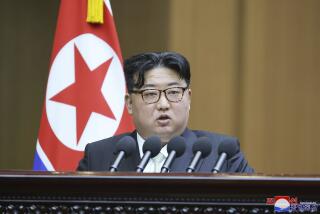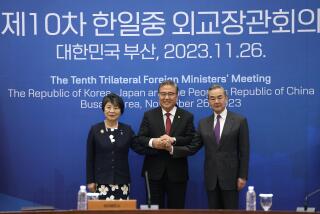2 Koreas OK High-Level Talks in Major Step Toward Reconciliation
- Share via
PANMUNJOM, Korea — North Korea and South Korea took a major step toward reconciliation Tuesday and agreed to a historic meeting between their top government leaders.
The talks could be held as early as August, officials said.
Delegates from the two countries met at the border truce village of Panmunjom and agreed to sign an accord July 26 that would outline a proposed agenda and procedures for the first meeting of prime ministers.
It would be the first such meeting since the division of the peninsula in 1945 into the Communist north and capitalist south.
In earlier talks, both sides agreed that the summit would be held alternately in the countries’ capitals. Each side would have seven representatives, including the prime minister and two military delegates.
The breakthrough on a summit came after South Korea accepted North Korea’s proposal to place political and military topics ahead of humanitarian and other exchanges on the agenda. Seoul had insisted on the opposite.
Tuesday’s meeting was the seventh of a series since February, 1989. The talks had been suspended for five months.
Unlike most dialogue between the countries, Tuesday’s was largely free of acrimony and tension.
South Korea’s chief delegate, Song Han Ho, later said he expects no problems in signing a procedural agreement for the summit. His northern counterpart, Paik Nam Jun, expressed similar views at a separate news conference.
Song said he hopes the prime ministers’ talks will open “a new chapter for realizing peaceful unification of the peninsula.”
“We cannot stick to the logic of the Cold War and ignore changes in the world any longer,” he said.
Paik said Tuesday’s accord “marked a new milestone in the history of the North-South Korea dialogue.”
Tuesday’s agreement was widely seen as a major breakthrough in that dialogue.
South Korean officials said arms reduction and other measures easing tensions could be discussed at the prime ministers’ meeting as a first step toward eventual unification.
More to Read
Sign up for Essential California
The most important California stories and recommendations in your inbox every morning.
You may occasionally receive promotional content from the Los Angeles Times.










